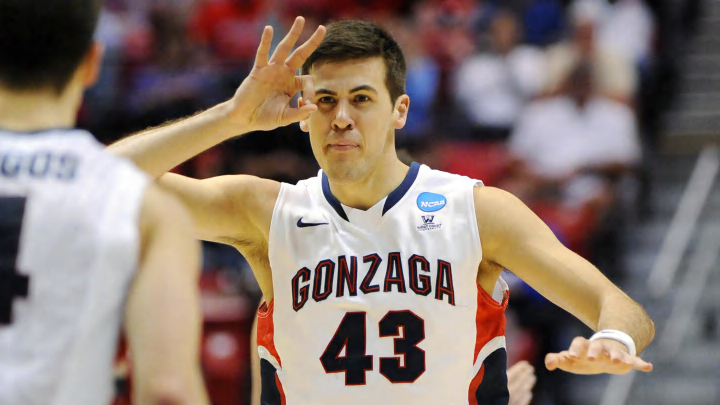Drew Barham wouldn't trade his Gonzaga experience for the world: 'It's a brotherhood'

Growing up in Memphis, Tennessee, former Gonzaga men’s basketball forward Drew Barham couldn’t have seen himself settling down thousands of miles away in Spokane, especially after a lengthy pro career that spanned all across Europe’s top leagues.
Barham idolized all the local legends — Anfernee “Penny” Hardaway, Elliot Perry, Rodney Carney, Antonio Anderson — and dreamed of playing college basketball at the University of Memphis. He originally signed with Southern Illinois coming out of Brothers High School, but a coaching change prompted him to decommit and instead commit to first-year head coach Josh Pastner and the Tigers.
“Memphis was the dream,” Barham said. “I’m from there, dad went there. Birthday parties I’d get a ticket to the game. It’d be like the top row of the Memphis Pyramid. It was my dream to play there.”
Turns out the dream wasn’t reality. Barham gained some experience, but overall it wasn’t great for him as a player. After his sophomore year, he transferred.
He had a list of “places I thought my game would translate” — Butler, Belmont and Gonzaga actually were considered fits — but Barham’s phone wasn’t getting messages from the top schools in the country. He was under the radar, until a solid workout at Mike Miller’s home gym caught the attention of a trainer, who then contacted the Zags about a 6-foot-6 guard who could shoot the lights out of the gym.
“The next week I ended up going to Poland and playing [with] the 21-under national team,” Barham recalled. “[Gonzaga] had just signed Pzremek Karnwoski. And so obviously Gonzaga was watching Pzremek and we were playing all the national teams on a tour through Germany and Poland … and so they ended up watching me and liking me.”
So much so in fact, an official visit to Spokane was set up shortly after the international tour. To this day, Barham recalls that workout with the Zags as “probably the best I’ve shot in my life.”
“Came in, lit it up,” Barham said. “And they offered me right after that.”
What followed was a modest career as a specialist off the bench with the Kelly Olynyk-led Bulldogs of the early 2010s. He shot 47.0% from 3-point range on 2.8 attempts per game. No game-winners of any sort, but he still vividly remembers how the town reacted when the Zags were ranked No. 1 in the AP Top 25 poll for the first time on that unforgettable Monday of March 4, 2013.
“The whole town had a No. 1 in every window,” Barham said. “Cakes 100 feet long on campus in the shape of No. 1. I mean, t-shirts with No. 1 on it. It was just a fun time to be a player and be a part of it.”
Barham played 64 games in two seasons with the Zags. He averaged 13.5 minutes as a reserve and put up 4.9 points per game. When he did get an open look it usually went in.
Perhaps he could have transferred to a school that offered more playing time. Barham was aware of this too, but he was drawn to Gonzaga’s family atmosphere and the culture of the men’s basketball program.
“I’ve seen different programs just in the transfer process and playing at Memphis,” Barham said. “A lot of places it’s a business — you go in there, make them money and you do what’s best for the college. Here it was completely opposite. It was a family atmosphere. It’s a brotherhood.”
“Looking back I wouldn’t trade it for the world just because camaraderie, the brotherhood, it means so much more to be successful and go somewhere and win, than get more shots up [somewhere else].”
Barham shared more about his life in Spokane, what it was like playing for Mark Few and much more on a new Forever Zags episode with Dan Dickau.
WATCH THE FULL EPISODE BELOW:
Produced by Thomas Gallagher.
FOLLOW GONZAGA NATION ON SOCIAL MEDIA
Continue to follow our Gonzaga coverage on social media by liking us on Facebook and by following us on Instagram and Twitter @GonzagaOnSI.
